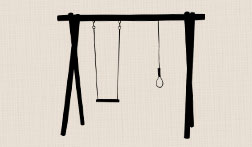Submitted by lratledge on
CRIN is campaigning for the abolition of inhuman sentencing of children, defined to include the death penalty, corporal punishment and life imprisonment. We want to emphasise that while, for the purposes of this campaign, CRIN is calling for the abolition of the juvenile death penalty, we believe that the death penalty should be abolished for all individuals, regardless of age.
While we welcome the abolition of, or moratoria on, the death penalty, we are concerned that this can lead to an increase in sentences of life imprisonment for children. As recognised by the UN Special Rapporteur on torture in March 2015, life imprisonment of children is also a form of cruel and inhuman punishment and so when the death penalty is abolished for children, the alternative must not be life imprisonment.
We welcome the recommendation in the Secretary-General’s previous report on the death penalty that States should immediately resentence all juvenile offenders on death row, while ensuring that these individuals do not receive life sentences in place of execution and urge the Secretary-General to continue to address the prohibition of the death penalty for child offenders within the context of achieving human rights compliant juvenile justice systems.
Legality of the juvenile death penalty - developments since 1 April 2016
Our research indicates that in 13 countries, capital punishment remains lawful for offences committed by children or is imposed despite being prohibited. Only five States are known to have executed a juvenile since 2005. However, as long as the sentence remains a possibility in national law, children run the risk of being executed should the situation in a given country change.
Kuwait reintroduced the death penalty for offences committed by children aged 16 or older on 1 January 2017. The reforms were introduced as a consequence of Law No. 111 which issued a new Juvenile Law. The reforms removed children aged 16 or older at the time of committing an offence from the protections of the juvenile justice system and repealed the categorical prohibition on life imprisonment and the death penalty for offences committed while under the age of 18, reintroducing both penalties for a number of offences committed by children. In March 2017, the National Assembly passed legislation to reverse these reforms.
The Philippines considered several bills during 2016 and 2017 that would reintroduce the death penalty in the country. The current draft of this legislation explicitly excludes people who were under the age of 18 at the time of committing an offence from the death penalty provisions.
Sentences and executions between 1 April 2016 and 31 March 2018
During this period, at least nine people were executed in Iran for offences allegedly committed while under the age of 18. Hassan Afshar was hanged on 18 July 2016 in Arak’s Prison in Markazi Province for the offence of lavat-e be onf (forced male to male anal intercourse) allegedly committed when he was 17. Hassan Hassanzadeh and Arman Bahr Asemani were both executed in January 2017 for murders they allegedly committed while they were 15 and 16 respectively. Alireza Tajiki was executed in August 2017 for forced male-to-male anal intercourse allegedly committed when he was 15. Iran Human Rights also report that young men called Asghar and Kabir Dehghanzehi were executed in May and July 2017 respectively for crimes allegedly committed while they were children. At least three people were executed in January in country for offences allegedly committed while under the age of 18.
At the time of writing, at least five people were at imminent risk of execution in Saudi Arabia for offences allegedly committed while they were children. Ali Mohammed al-Nimr, Dawoud Hussain al-Marhon and Abdullah Hass al-Zaher were all sentenced to death in 2014. Mujtaba al-Sweikat was sentenced to death in 2017. The death sentence of Abdulkarim al-Hawaj was upheld in July 2017 for an offence he allegedly committed when he was 16.
On 10 May 2016, Muhammad Sarfaraz was executed in Pakistan after 22 years on death row for an offence he allegedly committed while he was a child.
In the Maldives, figures produced by the Correctional Service indicate 18 people are on death row, of whom there is evidence that four were children at the time their offences were committed. In November 2017, the High Court upheld a death sentences against a young man who was sentenced to death by the Juvenile Court for being an accessory to a murder committed while he was under the age of 18. The Maldives has yet to carry out an execution since the reforms under the Penal Code 2014 and related regulations reintroduced the practice.

